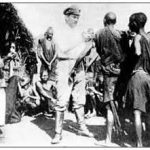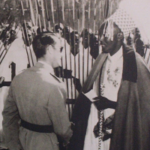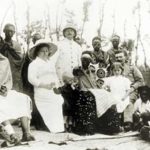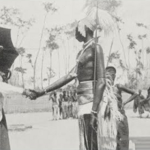Lineages And Government Exactions
Theintroduction of land prestations to Kinyaga during the reign of Rwabugiri altered the hereditary rights which Kinyagan
lineages had previously held over their land, as occupation became conditional upon compliance with a hill chief’s demands. Subsequently, authority which formerly had resided in the corporate group (defined by kin ties) and been embodied in the lineage head, came to be vested in a hill chief appointed from above. Since the lineage member appointed by the hill chief to collect prestations was not always the legitimate lineage head, there emerged a potential for conflict between persons with competing claims to leadership within the group.
A subtle modification also occurred in the definition of the prestation-paying unit. Although in the past the group which paid umuheto prestations had been defined by kin ties (and corporate ownership of cattle), for land prestations the criterion of residence was introduced as well. Each localized kin group was constrained to pay prestations to the chief of its hill. Thus, if members of a single lineage lived on two different hills (A and B), each of which had its own hill chief, the lineage members on hill A would give prestations to the chief of hill A, while members of the same lineage who lived on hill B would pay prestations to the chief of hill B. This change led to a diminution in the effective size of the “lineage” which gave prestations as a corporate group (though the terms to designate that group remained the same, umuryango).
The experience of the Abazirimo lineage at Muramba in Impara Province provides a good example of this shift. We have seen that this lineage began to give cows for land prestations during the time of Rwabugiri. The Abazirimo did not give one cow as a corporate group, however. Instead, members of the lineage who lived at Muramba were required to give one cow to the local hill chief each year, while other Abazirimo living farther south at Rwahi also gave a cow to the local hill chief on their hill. Here was the cutting edge between the demands of the hill chief and the umuheto prestations which had required only one cow from the lineage as a corporate group.
The Abazirimo were wealthy in cattle. Other lineages which owned few or no cattle were expected to contribute prestations in food products, normally a portion of their harvest of beans, peas, or sorghum each year. It was from among such lineages, defined as Hutu, that the hill chief would recruit victims for ubureetwa,a particularly servile type of clientship. Ubureetwa entailed services performed for the local hill chief as “payment” for occupation of the land. Initially, hill chiefs imposed ubureetwa on selected localized lineage groups. Later, ubureetwa came to be imposed on individual adult men as a result of European colonial policies.
European policy also modified the basis on which land prestations (amakoro y’ubutaka) were paid, and eliminated umuheto prestations. In 1926, the position of umuheto chief and the prestations due to him were officially abolished. Some Kinyagans, unaware of the changes, and not informed by the chiefs, continued to pay umuheto prestations for several years afterward. From 1931 to 1933, steps were taken to modify and eventually substitute money payments for the land prestations in kind. By 1934, a money payment had been introduced to replace all prestations in agricultural or other products. This consisted of a tax on each adult man in Rwanda, in Kinyaga amounting to 4 francs (1franc for the king, 1franc for the provincial chief, and 2 francs for the subchief). The Belgian administration intentionally did not introduce a money payment for ubureetwa at the time of this change, on the grounds that to do so would undermine the chiefs’ authority over the population.
Thus, as Rwanda entered its fourth decade under European rule, the three major political functions performed on the basis of corporate kin groups had either been transformed into responsibilities incumbent on individual adult men (ubutaka, ubureetwa), or abolished entirely (umuheto). While abolishing, modifying, or atternpting to limit “traditional” prestations, the administration also introduced new exactions. Chief among these were the head tax collected from 1917, and akazi {corvée, for public works projects and various forms of obligatory cultivation), which became generalized in the 1920s. A central feature of these levies was that they were imposed on individual adult men, not on lineages. Whereas the payment of prestations had initially reflected the corporate character of kin groups (even while leading to a reduction in their effective size), taxes and corvée (and ubureetwa in its modified form) bypassed the lineage to confront the individual directly. The role of kin groups as intermediary between an individual and the state was thus substantially reduced.
Supposedly every adult man was liable to pay taxes and perform corvée; ubureetwa, however, was imposed specifically on Hutu. But the local chief decided who actually paid and participated. Moreover, the type of work assigned to individuals for corvée often depended on their standing with the hill chief. The less irksome tasks (such as capita for work gangs, or messenger) went to those who were more favored: A poor man of low status most often would be called on to do the least desirable jobs. Many oral accounts attest to the hardships and insecurities these conditions created. Kinyagans often tried to escape the exactions by moving elsewhere in the region or by emigrating to the west:
Members of the Abatsuri lineage (Abiitira clan) at Nyamirundi left their homes and fled to another hill; the local chief had destroyed their huts because they had little land and thus had few mats or beans to give as prestations.
A son of Munambari (Abaganda lineage, Abagesera clan) left his home at Mugera because of the exactions of the hill chief, and went to live on another
A member of the Abajyujyu lineage at Butambamo lost his cows when they were seized by Birasinyeri, chief of Abiiru region at the time. The victim and his sons fled to the Congo.
Rukara, the grandfather of a man now living at Gashonga hill (Abiiru) was a client of Seekabaraga; Seekabaraga wanted to take Rukara’s cows, so Rukara left his home at Rwamiko (Impara) along with two of his brothers. Rukara obtained land from Cyimbuzi, hill chief at Gashonga; his two brothers obtained land at Mushaka. This incident occurred during the period of German rule, when Kaanayooge (Kandt) was at Shangi.
Some members of the Abateganya (Abakoobwa clan) at Gashonga were attacked and deprived of their property by Mutiijima, hill chief of Gashonga. They went to a neighboring hill, Rukunguri, which was part of Impara province (whereas Gashonga was in Abiiru). In this case, however, lineage unity was only impaired, not destroyed. Although responsible to a different chief for questions of land, those at Rukunguri still recognized the lineage head at Gashonga.
Mucyurabuhoro, a member of the Abarundi lineage (Abacyaba) at Gashirabwoba (Impara) left his lineage’s settlement because the lineage head, Yeeze, wanted to take cows from him to give to the Belgians for food. This occurred while Rwagataraka was chief of Impara. Mucyurabuhoro left Gashirabwoba and went to Gashonga where he obtained land from the hill chief, Mutiijima; one brother of Mucyurabuhoro came to Gashonga also.
Hill chiefs claimed for themselves land left vacant by such changes of residence. In distributing the land to others, the chief enhanced his power, for the recipient was then dependent upon the land donor (hill chief) as his “benefactor.” The original inhabitant of the land, who had fled, was not only separated geographically from his lineage mates, but was in addition rendered dependent upon the local chief of the place
where he sought to settle. Rather than being absorbed into an existing lineage on the hill, the new resident would normally remain as a separate “taxpayer” before the hill chitf. General population mobility within a small area therefore would ultimately benefit ail chiefs.





